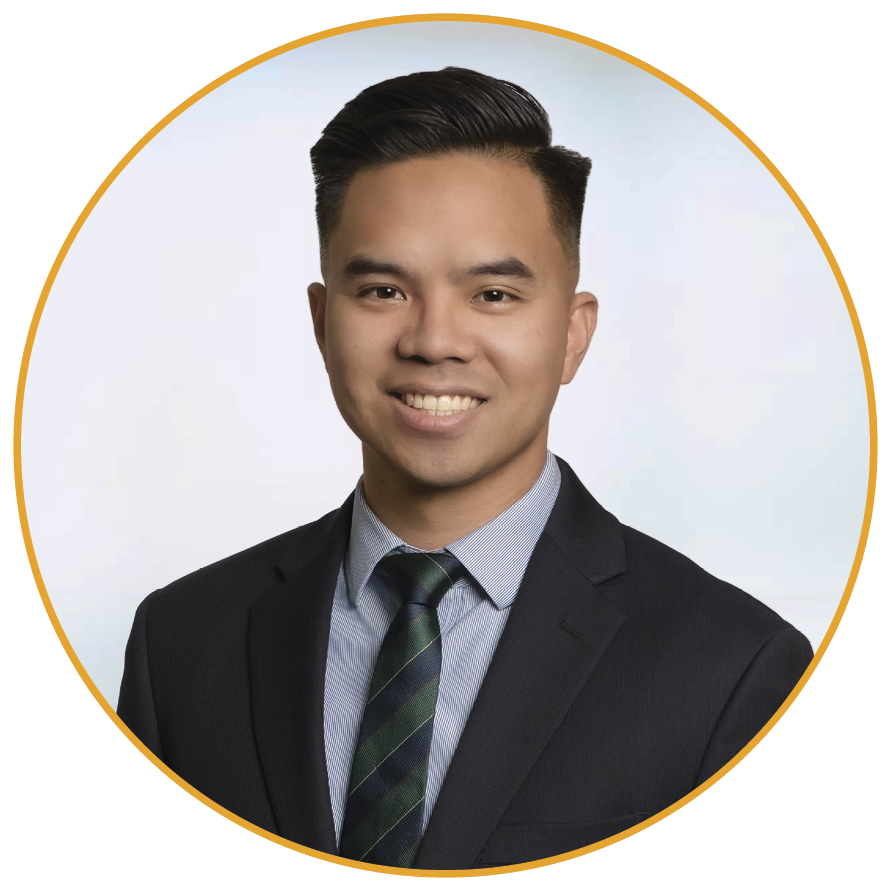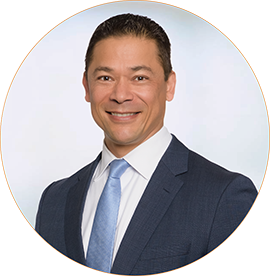 Paolo Hermoso
Paolo Hermoso
Paolo is a litigation attorney representing clients in an array of real estate and commercial disputes across the public and private sectors. Paolo also has significant experience representing clients spanning the breadth of the construction industry, including owners, contractors, subcontractors, design professionals and sureties, in a variety of complex litigation matters. He has resolved millions of dollars in claims arising from the construction and operation of various properties, including a mine site area water treatment plant, a public-works student housing project, a neurosciences research facility and a regional transportation hub.
How has your cultural background influenced your perspective on life and work?
I am a first generation Filipino-American from the San Fernando Valley raised by a single mother. Growing up, I did not know ANY attorneys. In fact, I don’t think I met an attorney until my sophomore year of college. Because of this, I used to put law students and attorneys on a pedestal, thinking they were somehow out of reach.
Fast forward to today, and I realize how important it is to break down those barriers. I strive to be personable, approachable and accessible, especially to those who might feel the same intimidation I once did. I want to make the legal profession feel more inclusive and show others from similar backgrounds that they too can pursue and succeed in a legal career.
Why did you decide to become a lawyer?
I wish I had something more philosophical or existential to say in response to this question, but the truth is, I decided to become a lawyer because of television — in particular, because of the most underrated TV show of all time, The Practice! At its peak, my mom and I used to watch The Practice on ABC every Sunday evening and would be absolutely riveted by the plot lines that actually focused on the mechanics of what it takes to prosecute and defend cases. I was truly inspired at a young age to become an attorney watching that show. I’ve recently given some episodes a rewatch and I can say that it still holds up and does an accurate job depicting the various legal aspects of the show — unlike many of the modern lawyer shows that are ludicrously unbelievable and lazy (looking at you, Suits).
What do you love about your work?
I love the intellectual stimulation I get out of the practice of law. The learning never stops and I believe it behooves every attorney to continue to work on their critical thinking, analytical, writing and public speaking skills. I do consider myself a generally curious person and I think that my desire to learn about various (often random) topics actually benefits me as a litigator. Although, my practice areas focus on real estate and construction litigation, within those areas alone I’ve been able to learn about various subject matters and industries that I never thought I’d become familiar with.
For example, in a recent jury trial involving a slope failure, I learned about hydrogeology and metallurgy, delving into the science behind water flow and the properties of different metals. This experience not only broadened my knowledge but also made me a more effective advocate for my client. I strive to bring this same curiosity and dedication to every case I handle, ensuring that I am always prepared and fully informed to serve my clients' best interests.
How do you believe your unique background and experiences contribute to diversity and inclusion in the workplace or community?
In the episode of Parts Unknown where Anthony Bourdain visits Manila, he says, “Filipinos are, for reasons I have yet to figure out, probably the most giving of all people on the planet.” During a recent trip to the Philippines—my first since I was six years old—I personally experienced the truth of Bourdain’s observation. Filipinos are indeed optimistic, hardworking and inherently generous, always ready to help one another, especially in times of need. Despite the Philippines' limited resources compared to other countries, Filipino optimism never seemed to run dry, manifesting in countless acts of kindness throughout my trip.
I strive to bring these same values to my workplace and community. One of my mentors at Nossaman once told me that if I continue to just be myself, success will come my way. This advice has resonated with me deeply. By embracing the innate generosity and resilience that define my heritage, I aim to foster a supportive and compassionate environment, both professionally and personally.
What is your proudest professional moment so far?
The moment I learned I passed the California bar exam is something I try not to forget or take for granted. As a litigator it’s inevitable that you’re going to experience moments that don’t bode well for you, whether it’s a ruling that goes against your client or a witness examination that you thought could have gone better. In those moments, I think it’s important to reflect on how I’ve come and to give myself a friendly reminder of just how much I’ve already accomplished. The pass rate for the California bar exam I took was a 67-year low for the summer test, so passing it felt especially meaningful to me.
Another example that stands out was the first time I argued a motion on behalf of a client at the LA Superior Court Stanley Mosk Courthouse in downtown LA. Prior to law school, I worked at the Stanley Mosk Courthouse as a judicial assistant. In that position, I drew lots of inspiration from the amazing oral advocates I was able to witness in both civil and criminal courtrooms. In many ways, my time as a judicial assistant at Stanley Mosk confirmed my desire become a litigator. So I thought it was special when I returned to Stanley Mosk for the first time not only as an attorney, but as an attorney representing the city where I was born and raised. It also helps that the judge granted our motion!
 Anna Tang
Anna Tang
Anna represents and advises emerging and established companies as transactional and general corporate counsel with respect to a wide variety of business transactions including mergers and acquisitions, commercial transactions and corporate governance. Having begun her career as a corporate and tax attorney at a top 20 law firm in Australia, Anna has expertise in assisting clients with commercial matters and tax effective structures for Australian investment and activities and advising multinational and foreign clients on Australian and international commercial and taxation issues.
What is your proudest professional moment so far?
I have a couple of proud professional moments. The first would be passing the California bar and becoming a lawyer in two countries – Australia (Victoria and New South Wales) and the US (California). Second would be my involvement in counselling a Big 6 accounting firm on its restructure and expansion in Australia and acting as lead counsel on a $161 million acquisition of a physician owned hospital in Oklahoma City. And, of course, being elevated to Partner this year!
Do you have any interesting talents or hobbies?
I speak three Chinese dialects (Mandarin, Cantonese and Teochew). I can also read Chinese and am conversational in French. I enjoy hiking – I have hiked through parts of Australia and Asia (Mongolia and Nepal). I also enjoy photography, especially when coupled with travelling.
What do you love about your work?
Lots – being a corporate attorney, I enjoy learning about all the aspects of my client’s business (they range from healthcare/ambulatory surgical centers, real estate developers to appraisal management companies) and I am generally curious about what keeps my clients up at night. I enjoy negotiating a transaction and drafting agreements to get the best deal possible for my clients.
 David Graeler
David Graeler
David brings more than 20 years of litigation and trial experience – representing both plaintiffs and defendants – to his engagements. He excels at partnering with clients to identify their goals and to develop and execute winning strategies to effectively resolve complex business disputes both inside and outside the courtroom. Through the development of his civil trial practice, he has honed his ability to communicate and connect with judges and juries, as well as with clients, witnesses and other attorneys. David serves as Nossaman’s Managing Partner.
Why did you decide to become a lawyer?
There are two reasons I decided to become a lawyer. The first major influence occurred when I was a child. My dad was involved in a complex business deal with two larger companies. He had identified the opportunity, introduced the two other companies to each other and largely orchestrated the deal. After significant time, effort and expense, the two larger companies decided to cut my dad out and do the deal without his business. This resulted in expensive and significant litigation. I saw the impact it had on my dad both personally and professionally. This was especially true because it was apparent that his lawyer was not well suited for the matter and it ultimately resulted in my dad losing his business. This left quite an impression on me and made me appreciate the importance of being a strong advocate for a client. I’ve heard of situations where people have decided to pursue a career in medicine due to a health-related tragedy that occurred to someone close to them when they were children. I suppose the same could be said for me with respect to the law.
The second driving force is that I’ve always enjoyed strategic competition. Throughout my youth and into college, I played baseball at a fairly high-level. I loved the competition and the camaraderie that came with playing a team sport. After my playing days ended and I was deciding upon my legal path, I discovered that high stakes litigation/trial work enabled me to experience the same type of competitive platform, camaraderie and opportunity for teamwork that baseball offered to me. And there’s far greater longevity without the risk of blowing out a shoulder!
Do you have any interesting talents or hobbies?
I’ve coached my son’s little league team for the past several seasons and I coached my daughter’s softball team before that. I’ve found it incredibly rewarding to work with the kids on my teams and to teach them not only about the fundamentals of the sport, but also the right way to compete and the all-important aspect of having fun. Other than that, having a busy practice and a family with two kids unfortunately limits my time for many hobbies. I do find it important to take some time for myself to exercise regularly.
What might people be surprised to learn about you?
That my mother was Chinese, my father is Jewish and that I was born in Tokyo, Japan. I spent my first four years of my life there and still have family in Japan and China (I still speak/understand a little bit of Japanese). I think this has given me a different perspective on people because I grew up not fully identifying with a particular ethnicity. In fact, I found that many Caucasian children would tease me for being Asian and many Asian children would tease me for being Caucasian. I was also frequently asked by children and adults throughout my childhood, what are you? This was incredibly difficult growing up because children generally just want to fit in. Over time, this became a source of great strength and I now find that I have an ability to empathize and relate to a wide variety of people.
